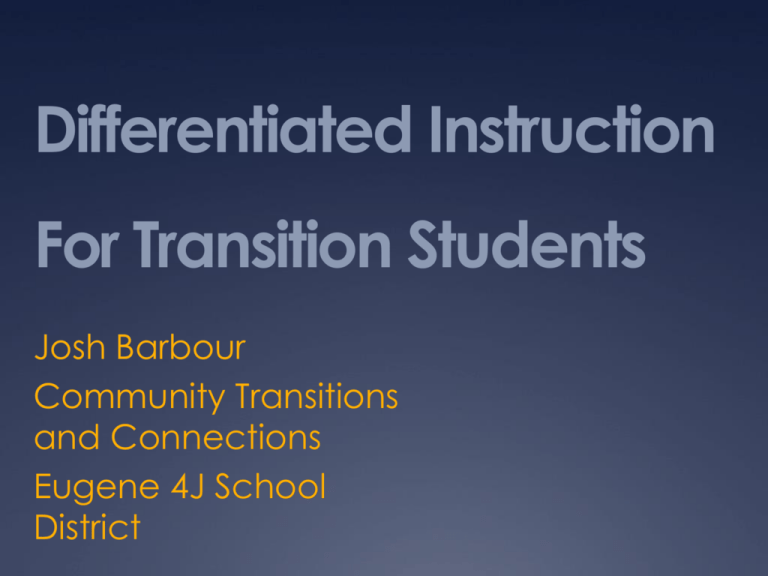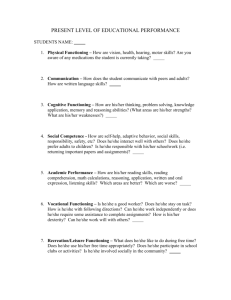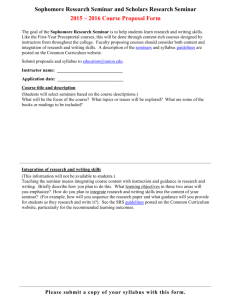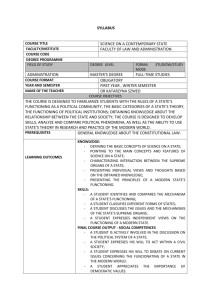What is Differentiated Instruction? Josh Barbour
advertisement

Differentiated Instruction For Transition Students Josh Barbour Community Transitions and Connections Eugene 4J School District 4J Connections Services 18 to 21 year old students Graduated with Modified Diploma, GED or Drop Out Wide Range of Disabilities (Learning Disability, Cognitive Impairment, Autism Spectrum Disorder, Emotional Disability, Visual/Hearing Impairment). Serve as A bridge to adult agencies (OVRS, LCDDS/Brokerage, Lane Community College, City of Eugene Recreational Services, etc). Identifying and Addressing Individual Student Needs Students create their own schedule. Students choose seminars, activities, course of study. How can you help students choose the activities that are aligned with their goals? Students have a wide variety of needs. How do you differentiate instruction to address all students needs? What do Transition Students Need to Know? Vocational Setting Educational Setting •Paid Job •Volunteer Site •College •Trade School •Job Corps Independent Living Recreational Setting Setting •Living in an Apartment •Living in a Dorm •Living with Parents •In the Community •On Line Identifying Skills For Each Setting Academic Skills: Reading, Writing, Math Executive Functioning Skills: Time Management, Organization, Disability Awareness Social Skills Social Communication, Problem Solving, Prudent Judgment Our New Paradigm Identifying Student’s Unique Needs Identifying 100, 200, 300 level skills for each setting on the Connections Skills Rubric Lane Community College Placement Test to assess academic present level Connections Executive Functioning and Social Skill Rating Scales to determine executive functioning and social skill present level Developing Transition Seminars to address needs of the current students. Students Are Not Restricted From Attending Seminars Each Seminar/Work Experience targets a 100, 200 or 300 level skill. During registration, students will be encouraged to attend seminars that address their skill level. A student with 300 level skills is able to take a seminar that targets 100 level skills (and vice versa). The instructor must modify curriculum to fit student needs. Each student attends a weekly advocate session. The assessments give a blueprint of skills needed to be addressed in advocate. Be Smooth Seminar • Be Smooth Seminar, Fall 2012. Seminar addressed recognizing hidden rules in various settings. • Seminar targets students with 100 level interpersonal and social communication skills. Please refer to rubric. Lesson: Consequences of Offensive Speech in Public. Clint Boyer and Jeff Gordon NASCAR incident Watch Crash: http://www.youtube.com/watch?v=C1klV_WiM8w (watch 0-:20) Watch Post Crash Interviews: http://www.youtube.com/watch?v=QS03Ep6dQyo (watch :25-1:08 discuss Jeff’s non verbal signs. Then watch 1:08-1:55) Reading and Comprehension Questions. Differentiating Instruction within the Be Smooth Lesson • Students worked in pairs to complete reading and answer comprehension questions • Students with 200 or 300 level social skills were paired with students with 100 level social skills • Writing was not required to complete activity. Students were asked to have a discussion with their partner. I individually checked in with each group to assess. • Provide an answer bank for students who needed assistance generating answers • Provide follow up discussion questions to encourage critical thinking Cooking For Cash • Cooking For Cash Seminar, Fall 2012. Seminar addressed technical, social and executive functioning skills needed to work in the restaurant industry. • Seminar targets students have demonstrated 200 level social and executive functioning skills. Please refer to rubric. • Lesson: Simulate a restaurant environment • • • Students separated as patrons, servers, prep cooks and chefs Students were required to follow specific directions in order to complete job expectations Students had to collaborate, communicate and problem solve to complete activity Cooking For Cash Differentiating Instruction within the Cooking For Cash Lesson • Students with 100 level executive functioning and social skills were paired with students with 200 level executive functioning and social skills • Students with 300 level executive functioning and social skills were given the job of “Floater.” Those students worked all 3 jobs and helped out when necessary. • Students were provided with video modeling of tasks before beginning activity • Staff identified students with 100 level academic and executive functioning skills and assisted reading and interpreting instructions. College Success Seminar • College Success Seminar will be taught Spring 2013. Seminar will focus on executive functioning and social skills needed to be successful in the college environment. • Seminar targets students that have demonstrated 300 level academic, social and executive functioning skills. Please refer to rubric. • Seminar will feature a syllabus, homework assignments, midterm and final to simulate a College Credit Class. • Students will visit an LCC College Classroom, LCC Disability Resources, Library, Math Resource Center, Writing Center to become familiar and comfortable with these resources. 300 Level College Success Lesson Lesson: Identifying and Requesting Accommodations • Watch University Of Delaware Tips for College Success: http://www.youtube.com/watch?v=cgg97kf327M (watch 0-1:18) • Watch example of a College Classroom: http://www.youtube.com/watch?v=83t7HwPW2Jg&feat ure=related (0-2:33) Students work in groups to brainstorm what behaviors they need to show to be successful in Professor White’s Classroom • Students are introduced to LCC Accommodations. Students brainstorm Accommodations they will need to be successful in the classroom • Students role play requesting accommodation from LCC Instructor. Differentiating Instruction within the College Success Lesson • Students with100 and 200 academic and executive functioning skills will be given modified classroom assignments and reduced homework. • Students with100 and 200 academic and executive functioning skills will be paired with students with 300 academic and executive functioning skills • Pre-teach expected behaviors before visiting college campus • Use a wide variety of instructional methods (video, role play, large group discussion, independent work) to address multiple learning styles. Weekly Advocate Sessions Opportunity to work individually with students • Students and teacher discuss strengths and needs • Students set a long term goal • Teachers assist students to set 4-5 enabling goals toward their long term goal • • Enabling goals should be in areas they scored 1 or 2 on the Social Skill and Executive Functioning Rating scale Teacher and Student record weekly progress on all enabling goals How would you serve these students? Please read the student profiles • What transition activities would you recommend for these students? • What enabling goals would you help them set to reach their long term goals? Thank You For Coming! Questions? Thoughts? Please feel free to contact me: Josh Barbour (541) 912-3618 barbour@4j.lane.edu Connections Website: https://sites.google.com/site/transitiontimesnow/









